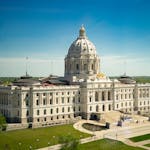The defining questions of our time might be: How is America going to reduce inequality and reform its dysfunctional political institutions? At the national level, with the 2020 presidential election approaching, the choice appears to be between a coalition of voters from large urban areas, and another made up of voters from rural areas. No matter who wins, the overwhelming likelihood is that a septuagenarian president will lead the country into the next decade, with all that implies.
But the greatest short-term progress on inequality might not be made at the national level, in big cities or in rural America, but in midsize cities. During the past couple of years, these cities have started evolving under the leadership of young, dynamic, pragmatic mayors, many of whom are black. The historic election of Steven Reed in Montgomery, Ala., last week is the latest example: Not only is he also black, but he was one of the first judges in the state to issue marriage licenses to gay couples. These mayors, taking advantage of the strong labor market and with the ability to be more nimble politically, have the opportunity to transform their cities, making progress on inequality and racial division even as dysfunction reigns elsewhere.
It's easy to come up with reasons why governance at the national level will be difficult — at least the next few years. Bipartisan legislation rarely happens anymore. A new era of governance would probably require that Democrats win the presidency and both chambers of Congress in 2020. But while Democrats are likely to hold the House of Representatives, it's an uphill climb for them to flip both the White House and the Senate; even if they do, they're likely to be constrained both by the legislative filibuster and senators from Trump states like West Virginia's Joe Manchin and Montana's Jon Tester. It's simply unlikely that we're going to see sweeping legislative change at the federal level in the near future.
Big cities and rural areas have a different set of problem — one is too hot and the other is too cold. Big cities are potent engines of economic growth, but they're expensive, congested and have perpetual housing shortages. Powerful institutions, the wealthy and special interests stymie reformers at every turn. Rural areas, on the other hand, have aging and shrinking populations, and often lack the educational and health care institutions, employers and the educated workforce needed to draw new talent and businesses.
Midsize cities exist somewhere in the middle of this spectrum. Although they have their share of challenges, they also have opportunities too, particularly now. For starters, the willingness to elect young mayors shows an openness to new ideas and fresh perspectives. America's most famous young mayor of a midsize city is Pete Buttigieg of South Bend, Ind., age 37. In the past couple of years he's been joined by a host of others. Randall Woodfin in Birmingham, Ala., is 38. Frank Scott Jr. in Little Rock, Ark., is 35. Michael Tubbs in Stockton, Calif., is 29. The aforementioned Reed in Montgomery is 45.
The tight labor market, which is pricing more and more people out of big cities, is paying dividends in midsize cities like these with large nonwhite populations. The unemployment rate in the Little Rock metro area hit 3.1% in August, a record low. Montgomery and Birmingham also hit record lows of 3% and 2.8%, respectively. Federal Reserve Chairman Jerome Powell has noted that wage growth is growing fastest for workers in lower-paid jobs, benefiting low and middle-income communities "to a degree that has not been felt for many years." September data from the Atlanta Fed shows that wage growth is surging for nonwhite workers.
This doesn't mean that everyone or even the average worker in these cities is thriving. But it does mean that local government efforts to improve the fortunes of residents in these communities have a tailwind for the first time in a while. Mayors in these cities have different ideas for what to focus on. Tubbs in Stockton is running a small-scale universal basic income experiment. Woodfin has announced an initiative called the Birmingham Promise that will provide free in-state tuition to public universities for all public high school graduates. Scott in Little Rock closed two public golf courses to save money and has built up a budget surplus and plans to invest in public safety and other areas.
For those discouraged by the dysfunctional state of politics, aging leadership and inequality in America, pay attention to these cities. Even if the federal government remains gridlocked, young black mayors leading cities with large minority populations during a time of low unemployment are a source of optimism, and may present the greatest concentrated opportunity to reduce inequality right now.
Connor Sen is a Bloomberg Opinion columnist. He is a portfolio manager for New River Investments in Atlanta and has been a contributor to the Atlantic and Business Insider.






